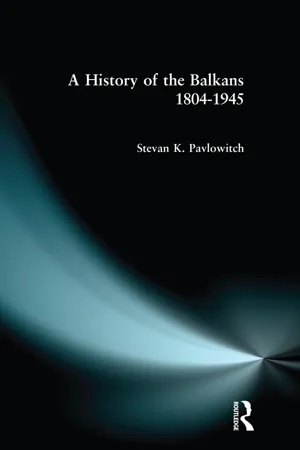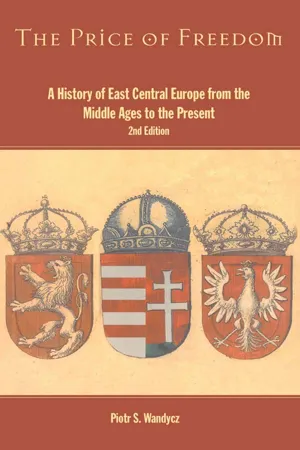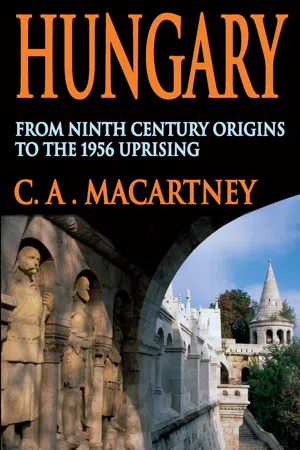Ausgleich
"Ausgleich" refers to the 1867 compromise between Austria and Hungary, which established the dual monarchy of Austria-Hungary. This agreement granted Hungary significant autonomy within the empire, including its own parliament and control over domestic affairs. The Ausgleich aimed to address the growing demands for autonomy and recognition of national identities within the empire.
5 Key excerpts on "Ausgleich"
- eBook - ePub
- Stevan K. Pavlowitch(Author)
- 2014(Publication Date)
- Routledge(Publisher)
...The Hungarians interpreted the ‘Austro-Hungarian’ Compromise as an arrangement to share certain affairs between their state and a neighbouring state called Austria. Austria, however, remained very much what it had been previously, but without Hungary – officially ‘the lands and realms represented in the Council of Empire’, It thus not only kept an empire for the emperor of Austria, but also until 1871 the illusory hope that it could somehow find again a dominating position in the German world. The Ausgleich had a shattering effect on the political development of the other nationalities. For both poles of the South Slavs, for Belgrade and Zagreb, the scheming and dreaming came to an end. Just when the Balkan states were more or less ready to launch their onslaught on the Ottoman Empire and expected at least some disruptions in the Austrian Empire, the latter reorganized itself into the Dual Monarchy, and the disappearance of Prince Michael of Serbia signalled an end to all plans of rebellion and war. Hungary became a highly centralized state. Its new government felt the need for a sub-compromise only towards Croatia, which was its main domestic problem. Elections for a new Sabor, under a new electoral law, a new ban, and administrative measures against the National Party, produced a unionist majority which sent a delegation to Buda (which was not united with Pest until 1872) to negotiate a settlement, and the result was the Nagodba (compromise) of September 1868. Croatia-Slavonia was an ‘adjacent territory’ of Hungary, with a measure of autonomy in running its administration, judiciary and education, with its Sabor and its local executive, under a ban appointed by the Hungarian prime minister. Otherwise it shared with the rest of Hungary a common king, government and parliament. It was then that Bishop Strossmayer retired from active political life, even though he retained a great personal influence until his death in 1905...
- Alan Sked(Author)
- 2015(Publication Date)
- Routledge(Publisher)
...The Germans of the Monarchy soon came to detest it and many Hungarians also wanted to alter it. The other races of the Monarchy – quite properly – felt cheated by it. Yet it stuck in its essentials. The Magyar leadership refused to countenance any alternative that would leave them with less power. And since Franz Joseph was not prepared to concede them any more, the Compromise was to become the sheet-anchor of the Hungarian state. Nothing could be done which might undermine it. Its terms came to be set in concrete, and only the end of the Monarchy was to bring the end of the Ausgleich. Most historians, like most contemporaries, have scarcely had a good word to say for the Compromise. Nor is it difficult to understand why. In the first place, it was an agreement made, not between the representatives of the various parts of the Monarchy, but between Franz Joseph and the Magyar leadership. Having reached this agreement, he then forced it on the ‘Austrian half’ of his domains, despite its unpopularity with most of his subjects there. Indeed, one leading Hungarian historian has recently suggested that it was not even popular with his Hungarian subjects. According to György Szabad, the Hungarian parliamentarians who drew it up had failed to address themselves ‘to the questionable legality of the 1865 elections and [had] failed also to take into account the fact that the conditions of the proposed settlement were hardly known to the electors who had given [Deák’s] party its parliamentary majority...
- eBook - ePub
- Jean Berenger, C.A. Simpson(Authors)
- 2014(Publication Date)
- Routledge(Publisher)
...CHAPTER FOURTEEN The Austro-Hungarian Compromise (1867) The Austro-Hungarian empire lasted half a century, from the Compromise of 1867 to the dissolution of Austria-Hungary in the autumn 1918. It was made up of Cisleithania and the kingdom of Hungary, officially ‘the lands and kingdoms represented in the Reichsrat ’. It was not known as the Austrian empire. It is easier to refer to it as the Danubian monarchy (Donaumonarchie), the term used today in Vienna, which shows that the state created in 1526 by the union of the kingdoms of Hungary and Bohemia and the German patrimony of the Habsburgs was essentially a confederation in which each land kept its originality and autonomy. The Empire had not been created by military conquest but by voluntary union on the basis of contracts between the Czech and Hungarian nations and the Habsburg monarchy, the exceptions to this being Galicia which was annexed in 1772 and Bosnia-Hercegovina which was occupied in 1878. It was an empire because the sovereign was also head of the Holy Roman Empire and thought of himself as heir to the Roman emperors. In 1804, when Napoleon Bonaparte was crowned emperor, the Habsburg sovereign took the title of hereditary emperor of Austria while remaining head of the Holy Roman Empire. It was only in 1806 that he renounced the title of Holy Roman Emperor and formally pronounced the Holy Roman Empire dissolved. In 1815 he refused to restore it. It was only in the nineteenth century that there was an emperor of Austria and a centralized empire existed only for the brief phase of neo-absolutism which lasted from 1849 and the end of the war of Hungarian independence, to 1859 and the defeat at Solferino which drove the Habsburgs from Italy and forced them to reorganize the monarchy on a federal basis. 1 The judicial foundations of the Empire were outside the Austro-Hungarian Compromise...
- eBook - ePub
The Price of Freedom
A History of East Central Europe from the Middle Ages to the Present
- Piotr S. Wandycz(Author)
- 2017(Publication Date)
- Routledge(Publisher)
...The Hungarian parliament adopted it in May 1867 and it became law by Act XII. The monarchy was transformed into a dualist state. The Austrian part, or Cisleithenia (the River Leitha divided the two) was officially known as Kingdoms and Lands represented in the Reichsrat; it could hardly pretend to be a homogeneous country. Hungary (or Transleithenia), now encompassing all the lands of the Crown of St Stephen, insisted officially on being a “unitary national state,” and allowed a sub-dualist arrangement only to Croatia. Austro-Hungary, ruled by the emperor-king, had a common army, foreign policy, and finances, but separate treasuries existed as well as equivalents of a home guard or national guard (in the American sense), called Landwehr in Austria and Honvéds in Hungary. Cabinets, parliaments, and administrations were either Austrian or Hungarian. An economic accord concluded at the time of the Compromise was to be renegotiated every ten years. “The nation,” wrote an outstanding Hungarian historian, “did not want the compromise, but neither did it want... to renew the fight against Vienna and the dynasty.” 46 The Compromise, he argued, restored to a large extent the sovereignty the country had enjoyed before Mohács and during the 1848 Revolution. But the fate of Hungary was now tied to Vienna. Kossuth regarded this as fatal and he prophesied from his exile that Hungary, no longer master of its own destiny, would go down with Austria. Deák and his supporters thought otherwise. They wanted to strengthen the Austro-Hungarian empire, because its disintegration would not benefit the Hungarians. Isolated between inimical Germans and Russians, they would be considered “raw material, to be used for the erection of other buildings.” 47 The Compromise marked in many respects a Hungarian political dominance in the empire, including external policies under the foreign minister, Gyula Andrássy...
- eBook - ePub
Hungary
From Ninth Century Origins to the 1956 Uprising
- C.A. Macartney(Author)
- 2017(Publication Date)
- Routledge(Publisher)
...Yet even here the improvement in her position was enormous. While the conduct of foreign affairs was still the monarch's prerogative, he now had to exercise it through a responsible minister, who, by con-vention, was chosen alternately from the 'Austrian' and Hungarian halves of the Monarchy. Moreover, any likeli-hood that Hungary's interests would in the future be sacrificed, as they had been so often in the past, in causes which did not interest her, was much diminished by the pragmatic fact that after the loss of Lombardo-Venetia Hungary was larger in area than the rest of the Habsburg dominions put together and by far the largest single unit in them. It was easily arguable that the protection afforded her by the Austrian connection now far outweighed its dangers. Map 4 The Era of Dualism showing the extent of the Austro-Hungarian rule She had an equal voice, in law, in the tariff policy of the Monarchy and in other questions affecting its economic and financial interests as a whole. The customs union with Austria could be denounced; for the present, it met the interests of the leading Hungarian circles. The quota of 30 per cent which she had agreed to pay towards the common expenditure was, again, subject to revision; meanwhile, it could not be regarded as inequitable. The real and large benefits which the Compromise con-ferred on Hungary were, however, half-hidden from the eye of the nation by the mists of suspicion engendered by the centuries in which the Austrian connection had brought it so much disadvantage; whereas there were certain points on which it was difficult for it to feel itself truly independent, even now. Easily the most conspicuous of these were those connected with the common army, over which, as has been said, Francis Joseph had retained a large measure of control...




